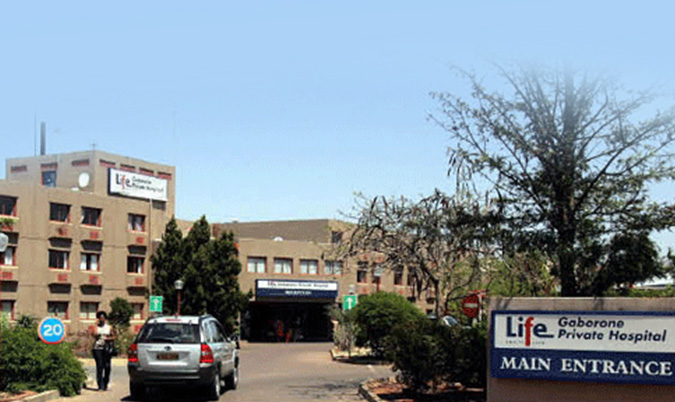- GPH engaged Lancet Laboratories to determine Covid-19 results
- GPH chief promises factual and comrehensive statement
- “COVID-19 tests have generally been notorious for high levels of false negatives and false positives.”-Health expert.
A South African medical laboratory, Lancet Laboratories, is alleged to be at the centre of the recent false COVID-19 results that saw President Mokgweetsi Masisi declare an indefinite lockdown over Gaborone and Greater Gaborone Zone last week, The Botswana Gazette has established.
It is alleged that the lab was engaged by Gaborone Private Hospital (GPH) to conduct COVID-19 tests on behalf of GPH. Some of the returning samples were said to be COVID-19 positive and the hospital informed the affected patients of the results.
In a statement shared with staff members last week, GPH management said it was proud of its staff because it is the only facility that is strictly enforcing COVID-19 pre-testing for both booked and emergency cases.
The Coordinator of the COVID-19 Task Force, Dr. Kereng Masupu, told The Botswana Gazette that government became aware of these results only upon making enquiries at GPH. This led to the decision to immediately shut the hospital down and impose a lockdown on the Greater Gaborone Zone in order to allow a robust contact tracing process and verify the GPH results.
An official at Lancet Laboratories Botswana, Sifiso Frank Mladzi has confirmed that the lab was responsible for the results. However, Mladzi said he could not comment further on the matter.
The results, which at the time were termed probables, were subsequently verified at a local laboratory. Speaking on Btv on Monday, the Deputy Coordinator of the COVID-19 Task Force, Professor Mosepele Mosepele, said 10 people of 16 probable cases had returned negative. The Director of Health Services, Dr. Malaki Tshipayagae, said an assessment of the situation was done after which President Mokgweetsi Masisi was advised to lift the lockdown.
“Their licences (GPH) could be revoked,” said a highly-placed source at the Ministry of Health (M0H). “This is a serious contravention of the Public Health Act.”
Part II of the Public Health Act deals with notifiable diseases in Botswana. “Notice of any notifiable diseases shall be furnished by the health officer concerned as soon as practicable to the Minister, in the prescribed form,” it states at subsection 5. As it turns out, GPH did not notify the Director of Health Services Dr. Tshipayagae, of their results. MoH authorities learnt of the situation by means of leaked information through the grapevine.
“Where, in the opinion of a health officer, any person certified to be suffering from a communicable disease is not accommodated or is not being treated or nursed in such manner as to adequately guard against the spread of the disease, such person may, on the order of a registered medical practitioner, be detained in or removed to a hospital or any temporary place which, in the opinion of the registered medical practitioner, is suitable for the reception of such person and there detained until the health officer or any medical practitioner duly authorised thereto by the Minister is satisfied that he is free from infection or can be discharged without danger to the public health,” says subsection 10 of the Public Health Act.
Subsection 12 of the same law reads: “Any person who knowingly lets for hire any dwelling or premises or part thereof in which any person has been suffering from a communicable disease without having the same, and all articles therein likely to retain infection, efficiently cleansed to the satisfaction of a health officer as testified by certificate signed by him shall be guilty of an offence.”
Sources say GPH may have contravened some of these provisions. Reached for comment, the Superintendent of GPH, Dr. Anthony Sibiya, said they would release a factual and comprehensive statement detailing the timeline of actual events in due course. He added that they did not want to be seen to be “fighting” with the Ministry of Health in the media.
A few months ago, South Africa’s Minister of Health, Dr. Zweli Mkhize, was forced to correct the country’s number of active COVID-19 cases after it emerged that some of the results had been false. The results concerned were said to have been produced by Lancet Laboratories. Before some of Botswana’s laboratories were authorised to verify COVID-19 tests, the Botswana Government of Botswana used the same lab.
Asked about credibility of Lancet Laboratories, Dr. Sibiya answered: “Yes, we are aware that there was a concern that was raised by the South Africa’s health minister. But you should remember that Lancet and Ampath are the two biggest laboratories in SA. We have used their services for a very long time even before COVID-19 and we trust their services.”
Speaking on condition of anonymity, a private health practitioner in Gaborone told The Botswana Gazette: “COVID-19 tests have generally been notorious for high levels of false negatives and false positives. So you may need to use more than one test to check for sure that the result is positive or negative. I have heard of errors margins as wide as 15 percent or more. And in this case WHO testing confirmations are a necessity. ”

